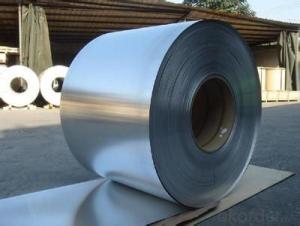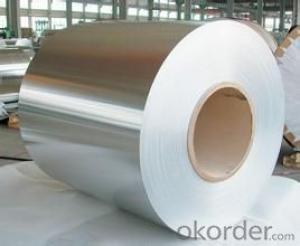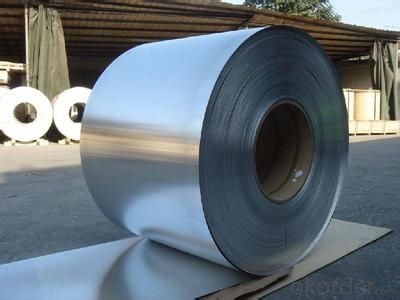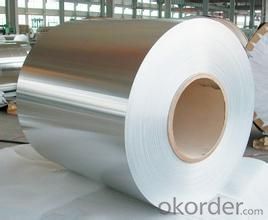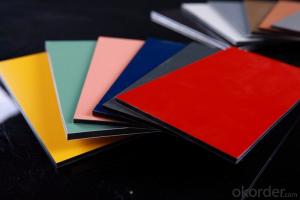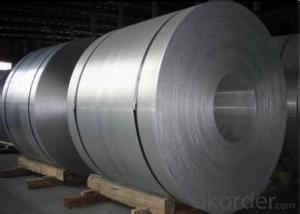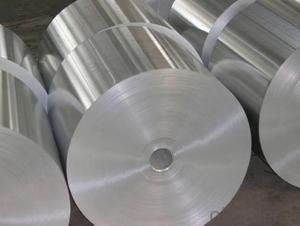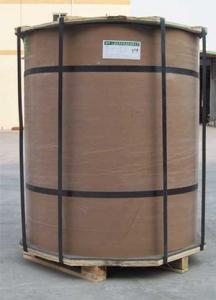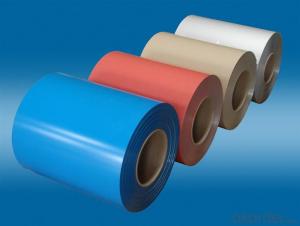Logan Aluminum Coils - Mill-Finished Alu Coil in Hot Sale
- Loading Port:
- China Main Port
- Payment Terms:
- TT OR LC
- Min Order Qty:
- -
- Supply Capability:
- -
OKorder Service Pledge
OKorder Financial Service
You Might Also Like
Aluminium is a relatively soft, durable, lightweight, ductileand malleablemetalwith appearance ranging from silvery to dull gray, depending on the surfaceroughness. It is nonmagnetic and does not easily ignite. A fresh film ofaluminium serves as a good reflector (approximately 92%) of visible lightand an excellent reflector (as much as 98%) of medium and far infraredradiation. The yield strength of pure aluminium is 7–11 MPa,while aluminium alloys have yield strengths ranging from200 MPa to 600 MPa. Aluminium has about one-third the densityand stiffness of steel. It is easily machined,cast, drawn and extruded.
Aluminium alloys (or aluminum alloys; see spellingdifferences) are alloysin which aluminium(Al) is the predominant metal. The typical alloying elements are copper, magnesium,manganese,silicon,tin and zinc. There are twoprincipal classifications, namely casting alloys and wrought alloys, both of which are furthersubdivided into the categories heat-treatableand non-heat-treatable. About 85% of aluminium is used for wrought products,for example rolled plate, foils and extrusions.Cast aluminium alloys yield cost-effective products due to the low meltingpoint, although they generally have lower tensile strengthsthan wrought alloys. The most important cast aluminium alloy system is Al–Si,where the high levels of silicon (4.0–13%) contribute to give good castingcharacteristics. Aluminium alloys are widely used in engineering structures andcomponents where light weight or corrosion resistance is required
Specification:
Alloy: AA1050, 1060, 1100,AA3003, 3005, 3015, 5052, 5754, 5083,8011, etc
Temper: H14/16/18/22/24/32,HO etc.
Thickness: 0.2mm—100mm
Width: 100mm—2300mm (Can be slitted)
Inner Diameter:508MM
Coil Weight:500kg-3000kg(Max.)
Application:Foil stock, Circles, Roofing, Can stock, Marine plate,Anti-slipery purpose in vehicles, packing and appliance.
Features:
1. Excellent quality of products
2. Quick delivery
3. Best service to clients
4. BV,SGS avalible
5. No buckle o waveness
6. Tension leveling
7. Certificate of Origin
8. Form A,E
Packaging Detail:
Carton ,Woodenpallet with plastic protection packing ,standard seaworthy packing or as yourrequest.
Production Capacity:
AnnualProduction capacity of 600,000 tons.
Products areexported to United States, Canada, U.A.E, Brazil, Mexico,Thailand, Vietnam,Nigeria etc, over 100 countries andregions all over the world.
Production Line:
CNBM aluminumproduction base is comprised of 18 aluminumannealers, 10 coil and foilmills, 4 continuous production lines, 2hot rolling production line and 3prepainted lines.
FAQ:
1. What is the form of payment?
Normally 30% TT, L/C
2. Type of quotation?
FOB, CFR, CIF
3. Port of loading?
Shanghai port
4. Delivery time?
30 days after client’s deposit
- Q: Is it possible to use a soldering iron to join aluminum coil with solder?
- <p>Traditional soldering irons are not suitable for soldering aluminum coils because aluminum does not readily bond with common solders used for irons. Aluminum has a high oxide layer that forms quickly, which prevents the solder from adhering. Specialized aluminum solder or fluxes are required for this task, and even then, the process might not be as effective as with other metals. For aluminum, brazing or welding techniques are often more appropriate.</p>
- Q: What are the rules and regulations regarding the use of aluminum coil in commercial kitchen settings?
- <p>Yes, there are regulations on the use of aluminum coil in commercial kitchens. These regulations often relate to food safety, hygiene, and the material's suitability for contact with food. Aluminum is generally safe for food contact, but it must meet specific standards to ensure it does not leach harmful substances into food. Regulations may vary by country or region, with some areas having strict guidelines on the types of aluminum alloys allowed and their intended use. Compliance with these regulations is crucial to avoid health risks and legal penalties. It's important for commercial kitchens to use food-grade aluminum and to follow local health department guidelines.</p>
- Q: How are aluminum coils used in the production of industrial machinery?
- Aluminum coils are widely used in the production of industrial machinery due to their unique properties and benefits. These coils are typically made from high-quality aluminum alloy, which offers excellent strength, durability, and corrosion resistance. One common application of aluminum coils in industrial machinery is in the manufacturing of heat exchangers. Heat exchangers play a crucial role in various industrial processes, including refrigeration, HVAC systems, and power generation. Aluminum coils are ideal for heat exchangers due to their high thermal conductivity, allowing for efficient heat transfer. Furthermore, aluminum coils are also utilized in the production of industrial equipment such as air compressors, pumps, and turbines. The lightweight nature of aluminum makes it an excellent choice for these applications, as it helps reduce the overall weight of the machinery. This, in turn, leads to improved energy efficiency and lower operational costs. Another significant advantage of aluminum coils is their malleability and formability. Aluminum is highly ductile, meaning it can be easily shaped and formed into various complex geometries required for the machinery's components. This allows manufacturers to create intricate parts and structures, ensuring precise fit and optimum performance. Additionally, aluminum coils offer exceptional resistance to corrosion, making them suitable for machinery used in harsh environments or exposed to corrosive materials. This corrosion resistance helps extend the lifespan of the machinery and reduces the need for frequent maintenance or replacement of parts. In summary, aluminum coils are essential components in the production of industrial machinery. They provide strength, durability, lightweight, and corrosion resistance, making them ideal for various applications such as heat exchangers, air compressors, pumps, and turbines. Their malleability also allows for intricate part fabrication, ensuring precise fit and optimal performance.
- Q: Can aluminum coils be used for heat transfer applications?
- Indeed, heat transfer applications can utilize aluminum coils. The commendable thermal conductivity of aluminum renders it remarkably efficient in transferring heat. In multiple heat transfer applications like air conditioning systems, refrigeration units, and heat exchangers, aluminum coils are frequently employed. The lightweight nature of aluminum, coupled with its resistance to corrosion, further contributes to its widespread preference in these applications. Moreover, the malleability of aluminum coils allows for the facile shaping and forming, thereby facilitating efficient heat transfer even in intricate systems.
- Q: What is the maximum coil diameter for aluminum coils?
- The maximum coil diameter for aluminum coils can vary depending on the specific application and industry standards. However, in general, aluminum coils typically have a maximum diameter of around 72 inches (6 feet) to ensure ease of handling and transportation.
- Q: Can aluminum coils be used in extreme temperature conditions?
- Yes, aluminum coils can be used in extreme temperature conditions. Aluminum has a high thermal conductivity and is resistant to corrosion, making it suitable for various temperature extremes. Additionally, aluminum's low melting point allows it to withstand high temperatures without deforming or losing its structural integrity.
- Q: I was wandering, if your spear's shaft is made of aluminum, does that have any strength to it, i mean, say you had to block with the shaft, would a weapon break through like your basic sword or basic axe, i don't mean big heavy swords and axes, but like average ones, could it break through an aluminum shaft of a spear?
- Why an aluminum spear? Why not a wood spear? A spear needs to be able to take the shock of hard contact against other weapons. If you are thinking that aluminum is lighter therefore faster, then you make a widely held mistake. If tow people of equal skill with a weapon were to face each other, then the one that has greater speed would have some advantage........but that does not mean that he would be the winner. There are many other factors that can determine the outcome. Better timing for one can beat speed. The martial arts are not simple things that can be calculated like math. Besides skills there is luck. None of us can predict that. Put two people against each other... One with an aluminum spear, the other with a wood spear, but better skills, and I'll bet on the better trained person. but as I stated, anything can happen due to luck, a mistake (it take only one), conditions. If two people fight and one wins, does that mean that he would always win if they fight over and over? These questions always assume way to many things to be true. Therefore they are flawed questions from the start. ... ...
- Q: What are the different alloy compositions used in aluminum coils?
- There are several different alloy compositions that are commonly used in aluminum coils, each with their own unique properties and applications. Some of the most frequently used alloy compositions include: 1. 1000 series alloys: These alloys are almost pure aluminum (with a minimum aluminum content of 99%), making them highly ductile and corrosion-resistant. They are often used in applications where high formability and good electrical conductivity are required, such as in electrical wiring and packaging. 2. 3000 series alloys: These alloys typically contain small amounts of manganese, making them stronger and more corrosion-resistant than the 1000 series alloys. They are commonly used in applications such as cooking utensils, chemical equipment, and decorative trim. 3. 5000 series alloys: These alloys contain magnesium as the primary alloying element, which significantly enhances their strength and hardness. They are known for their excellent resistance to corrosion and are often used in marine environments, as well as in the automotive and aerospace industries. 4. 6000 series alloys: These alloys are alloyed with magnesium and silicon, which results in improved strength, heat treatability, and weldability. They are commonly used in applications such as architectural and structural components, as well as in transportation and electrical conductors. 5. 7000 series alloys: These alloys are primarily composed of zinc as the main alloying element, which gives them exceptional strength and toughness. They are commonly used in high-stress applications such as aircraft structural components and sporting equipment. It's important to note that there are many other alloy compositions used in aluminum coils, each tailored to specific requirements and applications. The choice of alloy composition depends on factors such as desired strength, corrosion resistance, formability, and cost considerations.
- Q: Are aluminum coils suitable for interior design applications?
- Yes, aluminum coils are suitable for interior design applications. Aluminum is a versatile material that offers a wide range of benefits for interior design projects. Firstly, aluminum is lightweight, making it easy to handle and install. This is especially advantageous for projects that require large-scale installations or suspended ceilings. Additionally, aluminum coils are highly durable and resistant to corrosion, ensuring their longevity and making them suitable for high-traffic areas. Furthermore, aluminum can be easily customized and shaped to meet specific design requirements, allowing for endless design possibilities. The material is also available in a variety of finishes, such as brushed, polished, or anodized, which can enhance the aesthetic appeal of any interior space. Moreover, aluminum is a sustainable and eco-friendly option, as it is easily recyclable and has a low carbon footprint compared to other materials. Overall, aluminum coils are a practical and aesthetically pleasing choice for interior design applications.
- Q: This question asks for methods to determine whether an aluminum coil is made from recycled material.
- <p>Determining if an aluminum coil is made from recycled material can be challenging without specific testing, as recycled and virgin aluminum can look identical. However, there are a few indicators: 1) Look for certification or labels on the coil indicating it's made from recycled material. 2) Check with the supplier for documentation or a certificate of analysis that confirms the material's origin. 3) Analyze the coil's composition; recycled aluminum may have slight variations in purity or alloy composition. 4) Use spectrographic analysis to determine the exact composition of the aluminum, which can sometimes reveal if it's recycled. Ultimately, transparency from the supplier is key to confirming the source of the aluminum.</p>
Send your message to us
Logan Aluminum Coils - Mill-Finished Alu Coil in Hot Sale
- Loading Port:
- China Main Port
- Payment Terms:
- TT OR LC
- Min Order Qty:
- -
- Supply Capability:
- -
OKorder Service Pledge
OKorder Financial Service
Similar products
Hot products
Hot Searches
Related keywords
